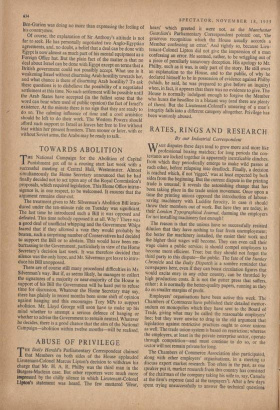ABUSE OF PRIVILEGE
THE Daily Herald's Parliamentary Correspondent claimed that Members on both sides of the House applauded Lieutenant-Colonel Marcus Lipton's decision to withdraw his charge that Mr. H. A. R. Philby was the third man in the Burgess-Maclean case. But other reporters were much more impressed by the chilly silence in which Lieutenant-Colonel Lipton's statement was heard. The few muttered 'Hear, hears' which greeted it were not, as the Manchester Guardian's Parliamentary Correspondent pointed out, 'the generous recognition which the House usually accords a Member confessing an error.' And rightly so, because Lieu- tenant-Colonel Lipton did not give the impression of a man confessing an error. He seemed, rather, to be wriggling out of a piece of peculiarly unsavoury deception. His apology to Mr. Philby, such as it was, is only part of the story. He still owes an explanation to the House. and to the public, of why he declared himself to be in possession of evidence against Philby (which, he said, he was prepared to give before an inquiry) when, in fact, it appears that there was no evidence to give. The House is normally indulgent enough to forgive the Member who hunts the headline in a blatant way (and there are plenty of them). But the Lieutenant-Colonel's smearing of a man's integrity falls into a different category altogether. Privilege has been wantonly abused.










































































 Previous page
Previous page